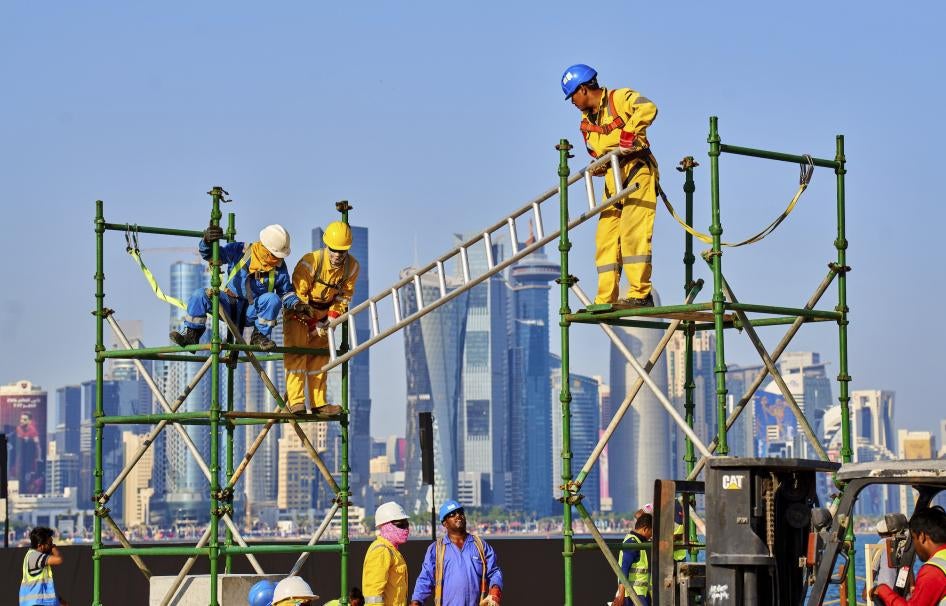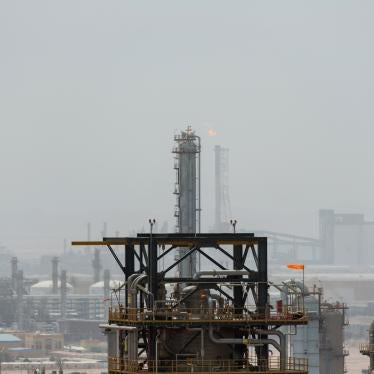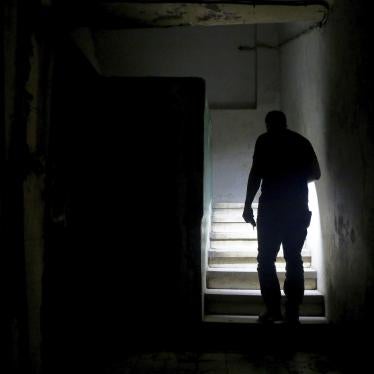(Beirut) – Migrant workers are playing an indispensable role in addressing extreme heat in Gulf Cooperation Council countries, yet these governments are failing to protect essential workers from dangers related to climate change, Human Rights Watch said on International Migrants Day on December 18, 2023.
Multiple studies and projections have indicated that the risks of extreme heat have escalated in the Gulf states in recent years due to climate change. While all workers in the Gulf face risks from extreme heat, migrant workers are overwhelmingly exposed to the most dangerous working conditions in the region.
Human Rights Watch interviewed six air conditioning repair technicians who serve a critical role in protecting Gulf residents from extreme heat. A former Saudi-based technician said air conditioning repair requests became “a matter of urgency, especially in cases involving older people, people with disabilities, or sick residents who could not relocate easily.” These groups face particularly stark risks from extreme heat.
“Air conditioning technicians are just one example of often invisible but indispensable migrant workers who are making life safer in the increasing Gulf heat, yet Gulf state policies and employers regularly treat them as disposable,” said Michael Page, deputy Middle East director at Human Rights Watch. “International Migrants Day should draw attention to the need to reform the blatant contradiction of exploitative labor practices in jobs critical to help people cope with the climate crisis.”
Human Rights Watch has documented how migrant workers are critical to address climate risks yet they face serious abuses like extreme heat, wage theft, and exorbitant recruitment fees.
While the United Nations COP28 climate conference, held in the United Arab Emirates (UAE), finally acknowledged the need to transition away from fossil fuels, it fell short of a clear and time-bound commitment to phase out fossil fuels as the main driver of the climate crisis. The climate crisis disproportionately further escalates the risks harms marginalized groups like migrant workers and their home communities, which are in many cases at the forefront of climate change impacts.
The Gulf states – Bahrain, Kuwait, Oman, Qatar, Saudi Arabia, and the UAE – host large migrant worker populations under various iterations of the exploitative kafala (sponsorship) system, which ties migrant workers’ visas to their employers and leaves them vulnerable to abuse.
With worsening climate change, extreme heat is affecting a growing number of outdoor workers across the world. The temperatures and conditions in the Gulf region are already extreme, with maximum daily temperatures exceeding 40 degrees Celsius (104 degrees Fahrenheit) between 100 to 150 days a year. This makes the region extremely vulnerable to climate change that threatens even the future of human habitation.
The Intergovernmental Panel on Climate Change has said that Gulf states’ extreme wet-bulb global temperature, a measure of the actual impact of heat and related conditions, is expected to approach, and possibly exceed, the physiological threshold for human adaptability – 35 degrees Celsius or around 95 degrees Fahrenheit – by the end of the century.
Migrant workers have played an indispensable role in the transformation and expansion of the Gulf’s urban infrastructure despite the extreme heat. They are and will be increasingly essential in advancing the helping people cope with increasing extreme heat.
An air conditioning technician for three school buildings said that air conditioning units operating at full capacity 24 hours a day required frequent repairs. “We continued working despite extreme conditions, spending at least eight hours a day [of a 12-hour workday] on the rooftop in repair cases. With the increase in temperature, our jobs become harder and harder.”
He said his employer was responsible for wage abuses, including not paying overtime, confiscating workers’ passports to keep them from leaving, exorbitant recruitment fees, and inadequate safety protections on job sites.
A former Qatar and UAE-based migrant worker said that his job with a hotel as a preventive maintenance technician not only involved air conditioning maintenance and repair work but improvement of the hotel’s energy efficiency initiatives. “We transitioned to LED lights and upgraded to occupancy-based air conditioning that saved the property money and reduced their energy usage,” he said.
Extreme heat is a serious health hazard. Workers have described experiencing dehydration, nosebleeds, nausea, dizziness, headache, fainting and fever from working in extreme heat.
Yet, heat protection measures applied uniformly across Gulf countries are woefully inadequate as they continue to rely on arbitrary and ineffective calendar-based midday bans despite evidence that they are ineffective. While risk-based measures such as the Wet Bulb Global Temperature index are more effective, only Qatar has introduced legislation that prohibits work when the index rises beyond 32.1 degrees Celsius (about 90 degrees Fahrenheit), even though that threshold has been criticized as too high to effectively protect workers. In addition, there are serious enforcement gaps.
A heating, ventilation, and air conditioning technician in Dubai said that the urgent nature of his work repairing air conditioners at metro stations, malls, and cinemas made it common to violate summer midday heat bans. In such cases, he said, workers at his company were “provided umbrellas and made to work together in pairs.”
Despite difficult and often dangerous conditions, Human Rights Watch has extensively documented widespread labor abuses across the Gulf. A former Dubai-based AC technician who left the UAE after not being compensated in full for over a year and a half said, “Eventually, after waiting patiently for long, we decided collectively that it does not make sense staying when we are not getting paid as promised.” With three of his colleagues, his work had entailed repairing and maintaining between 100 to 150 air conditioning units a day.
Another former Saudi-based migrant worker who serviced about 10 units and two to three larger heating, ventilation, and air conditioning systems said he left because of nonpayment of wages. “The financial strain got so severe that we even lacked the means to buy food,” he said.
Other common abuses including crowded living conditions, absence of shaded rest areas at worksites, and lack of air-conditioned transportation services during commutes also affect workers’ ability to rest, rehydrate, and recover from heat exposure.
One air conditioning repair worker said that he shared one bathroom with 60 people in his employer-provided housing for an entire year, and it was only during his second year that the company built an additional bathroom facility. At worksites, he said, rest areas and refrigeration were not always available. “The only option we had were electrical rooms for short breaks,” he said. “The absence of a refrigerator would sometimes spoil our packed lunches.”
Another described camps where migrant workers lived in Saudi Arabia as being “made of containers” that were equipped with old air conditioners that broke down, which had to be fixed daily.
“The annual climate conference is over, and now it is critical that Gulf countries address the widespread abuses against migrant workers essential to helping Gulf residents cope with the escalating climate risks,” Page said.







